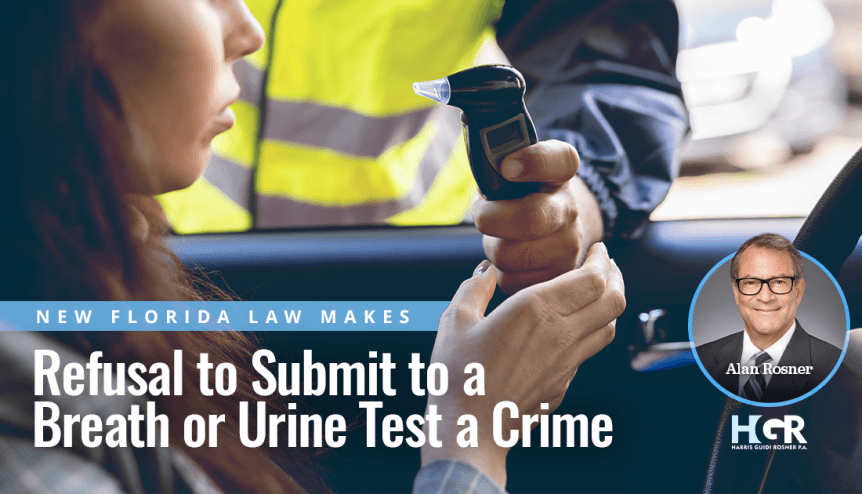Effective October 1, 2025, Florida law has changed significantly for drivers arrested for driving under the influence (DUI). Under the amended statute, refusing to submit to a breath, blood, or urine test when lawfully requested by law enforcement is now a second-degree misdemeanor, even for a first offense.
Previously, only a second or subsequent refusal could be prosecuted criminally. This change gives the State Attorney’s Office the ability to file criminal charges against anyone who refuses to provide a sample, regardless of whether they have a prior DUI or prior refusal.
Why This Matters
This change represents a major shift in Florida’s approach to DUI enforcement. For years, many drivers believed, sometimes even based on outdated or incorrect legal advice, that it was always better to refuse a breath test than to risk providing evidence of impairment. That belief now carries serious risks.
Encouraging or advising someone to refuse a lawful test could amount to advising them to commit a crime, which is not only unethical but potentially illegal. The new law underscores the importance of understanding your rights and obligations during a DUI investigation.
Administrative Penalties Still Apply
In addition to potential criminal prosecution, administrative consequences imposed by the Department of Motor Vehicles remain in place for anyone who refuses to take a breath, blood, or urine test.
- First refusal: A one-year driver’s license suspension.
- Second refusal: An 18-month suspension.
Even beyond these suspensions, the Florida Department of Highway Safety and Motor Vehicles (DHSMV) imposes a “hard suspension” period during which you may not drive for any reason, 90 days for a first refusal, unless you have properly requested a formal review hearing. These penalties are separate from any criminal consequences that may result from a DUI arrest or conviction. A second refusal results in an 18-month license suspension with no option to obtain a business or hardship license.
Possible Jail Time
Because a refusal is now a second-degree misdemeanor, a conviction can carry up to 60 days in jail and a $500 fine, in addition to the administrative suspension. This is a significant escalation from prior law, where a first refusal led only to a license suspension and administrative penalties.
In short, what used to carry administrative consequences has now become a criminal act. A driver who refuses a test could face jail time, even without a DUI conviction.
Your Right to an Attorney During a DUI Investigation
It’s natural to want to speak to a lawyer before deciding whether to submit to a test. However, under Florida law, there is no right to consult an attorney before deciding whether to take a breath, blood, or urine test. Law enforcement officers are not required to provide you access to an attorney during the course of a DUI investigation.
You do, however, have the right to remain silent and to decline to make statements that may be used against you later in court. But an attorney cannot intervene in an ongoing investigation or prevent officers from administering a test when legally authorized.
The Best Way to Avoid These Situations
The most effective way to avoid facing these serious consequences is simple: do not drive if you have consumed alcohol or any substance to the extent that your normal faculties are impaired. The combination of administrative penalties, possible criminal prosecution, and the risk of injury or death makes it simply not worth it.
Consult an Experienced DUI Attorney
If you or someone you know has been arrested for DUI or has questions about how this change in the law may apply to their case, it is important to seek legal guidance immediately. The lawyers at Harris Guidi Rosner, P.A. have decades of experience representing clients in DUI and criminal defense matters throughout Jacksonville and Northeast Florida.
We can help you understand your rights, navigate the administrative and criminal processes, and work to protect your driving privileges and your record.
For a consultation, contact Harris Guidi Rosner, P.A. at (904) 777-7777 or receive a Free Consultation.
